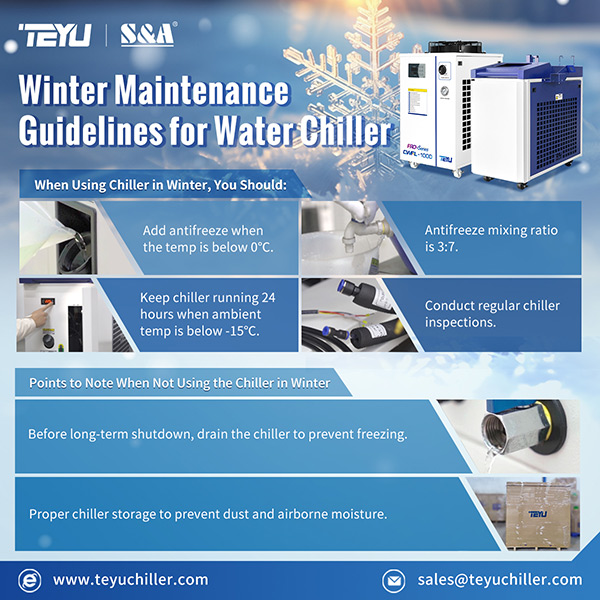คุณรู้วิธีการบำรุงรักษาเครื่องทำน้ำเย็นแบบระบายความร้อนด้วยอากาศในฤดูหนาวหรือไม่? การใช้งานเครื่องทำน้ำเย็นในฤดูหนาวจำเป็นต้องใช้น้ำยาป้องกันการแข็งตัวเพื่อให้มั่นใจถึงความเสถียร การปฏิบัติตามคำแนะนำเกี่ยวกับเครื่องทำน้ำเย็นเหล่านี้สามารถช่วยคุณป้องกันการแข็งตัวและปกป้องเครื่องทำน้ำเย็นของคุณในสภาพอากาศหนาวเย็นได้
คุณจะดูแลรักษาเครื่องทำน้ำเย็นระบายความร้อนด้วยอากาศในฤดูหนาวอย่างไร?
การใช้งานเครื่องทำความเย็นในฤดูหนาวจำเป็นต้องใช้มาตรการป้องกันการแข็งตัวเพื่อให้มั่นใจถึงความเสถียร การปฏิบัติตามคำแนะนำเหล่านี้สามารถช่วยคุณป้องกันการแข็งตัวและปกป้อง เครื่องทำความเย็นน้ำ ของคุณในสภาพอากาศหนาวเย็นได้
เมื่ออุณหภูมิต่ำกว่า 0℃ ให้เติมสารป้องกันการแข็งตัว: สารป้องกันการแข็งตัวสามารถลดจุดเยือกแข็งของน้ำหมุนเวียน ป้องกันการแข็งตัวและการแตกร้าวของท่อ และช่วยรักษาการปิดผนึกของท่อ ดังนั้น เมื่ออุณหภูมิต่ำกว่า 0℃ ให้เติมสารป้องกันการแข็งตัวทันที
อัตราส่วนการผสมสารป้องกันการแข็งตัว: เพื่อให้เครื่องทำความเย็นเลเซอร์ทำงานได้ตามปกติ ควรควบคุมอัตราส่วนของสารป้องกันการแข็งตัวต่อน้ำอย่างเคร่งครัด อัตราส่วนที่แนะนำคือ 3:7
*เคล็ดลับ: ขอแนะนำให้ไม่เกิน 30% สำหรับอัตราส่วนสารป้องกันการแข็งตัวที่เพิ่มเข้าไปเพื่อป้องกันการอุดตันของท่อและการกัดกร่อนของอุปกรณ์อันเนื่องมาจากความเข้มข้นที่สูง
เครื่องทำความเย็นน้ำทำงาน 24 ชั่วโมง: ให้เครื่องทำความเย็นเลเซอร์ทำงานต่อเนื่อง 24 ชั่วโมงเมื่ออุณหภูมิโดยรอบต่ำกว่า -15℃ เพื่อให้แน่ใจว่ามีการหมุนเวียนน้ำอย่างต่อเนื่องและป้องกันการแข็งตัว
การตรวจสอบตามปกติ: ตรวจสอบระบบระบายความร้อนของเครื่องทำความเย็นเป็นระยะ รวมถึงท่อและวาล์วน้ำหล่อเย็น เพื่อหารอยรั่วหรือสิ่งอุดตัน แก้ไขปัญหาทันทีเพื่อให้มั่นใจว่าเครื่องทำงานได้ตามปกติ
สิ่งที่ควรคำนึงถึงเมื่อไม่ใช้เครื่องทำความเย็นในฤดูหนาว?
1. การระบายน้ำ: ก่อนปิดเครื่องเป็นเวลานาน ควรระบายน้ำออกจากเครื่องทำความเย็นเพื่อป้องกันการแข็งตัว เปิดวาล์วระบายน้ำด้านล่างเพื่อระบายน้ำหล่อเย็นออกให้หมด ถอดท่อน้ำออกและระบายน้ำภายในเครื่องโดยการเปิดช่องเติมน้ำและวาล์ว จากนั้นใช้ปืนลมอัดเป่าให้ท่อภายในแห้งสนิท
หมายเหตุ: หลีกเลี่ยงการเป่าลมบริเวณข้อต่อที่มีฉลากสีเหลืองติดอยู่ด้านบนหรือด้านข้างของทางเข้าและทางออกของน้ำ เนื่องจากอาจทำให้เกิดความเสียหายได้
2. การจัดเก็บ: หลังจากระบายน้ำและแห้งแล้ว ให้ปิดผนึกเครื่องทำความเย็นอีกครั้ง ขอแนะนำให้เก็บอุปกรณ์ไว้ในที่ที่ไม่ส่งผลกระทบต่อการผลิตเป็นการชั่วคราว สำหรับเครื่องทำความเย็นแบบน้ำที่ตั้งอยู่กลางแจ้ง ควรพิจารณามาตรการต่างๆ เช่น การหุ้มเครื่องทำความเย็นด้วยวัสดุฉนวน เพื่อลดอุณหภูมิและป้องกันฝุ่นและความชื้นในอากาศไม่ให้เข้าไปในเครื่องทำความเย็น
ระหว่างการบำรุงรักษาเครื่องทำความเย็นในฤดูหนาว ควรให้ความสำคัญกับน้ำยาป้องกันการแข็งตัว การตรวจสอบอย่างสม่ำเสมอ และการจัดเก็บอย่างเหมาะสม หากต้องการความช่วยเหลือเพิ่มเติม โปรดติดต่อทีมบริการลูกค้าของเราผ่านservice@teyuchiller.com หากต้องการข้อมูลเพิ่มเติมเกี่ยวกับ การบำรุงรักษาเครื่องทำน้ำเย็น TEYU S&A โปรดคลิกที่ TEYU Chiller Case


เราอยู่ที่นี่เพื่อคุณเมื่อคุณต้องการเรา
กรุณากรอกแบบฟอร์มเพื่อติดต่อเรา และเรายินดีที่จะช่วยเหลือคุณ









































































































